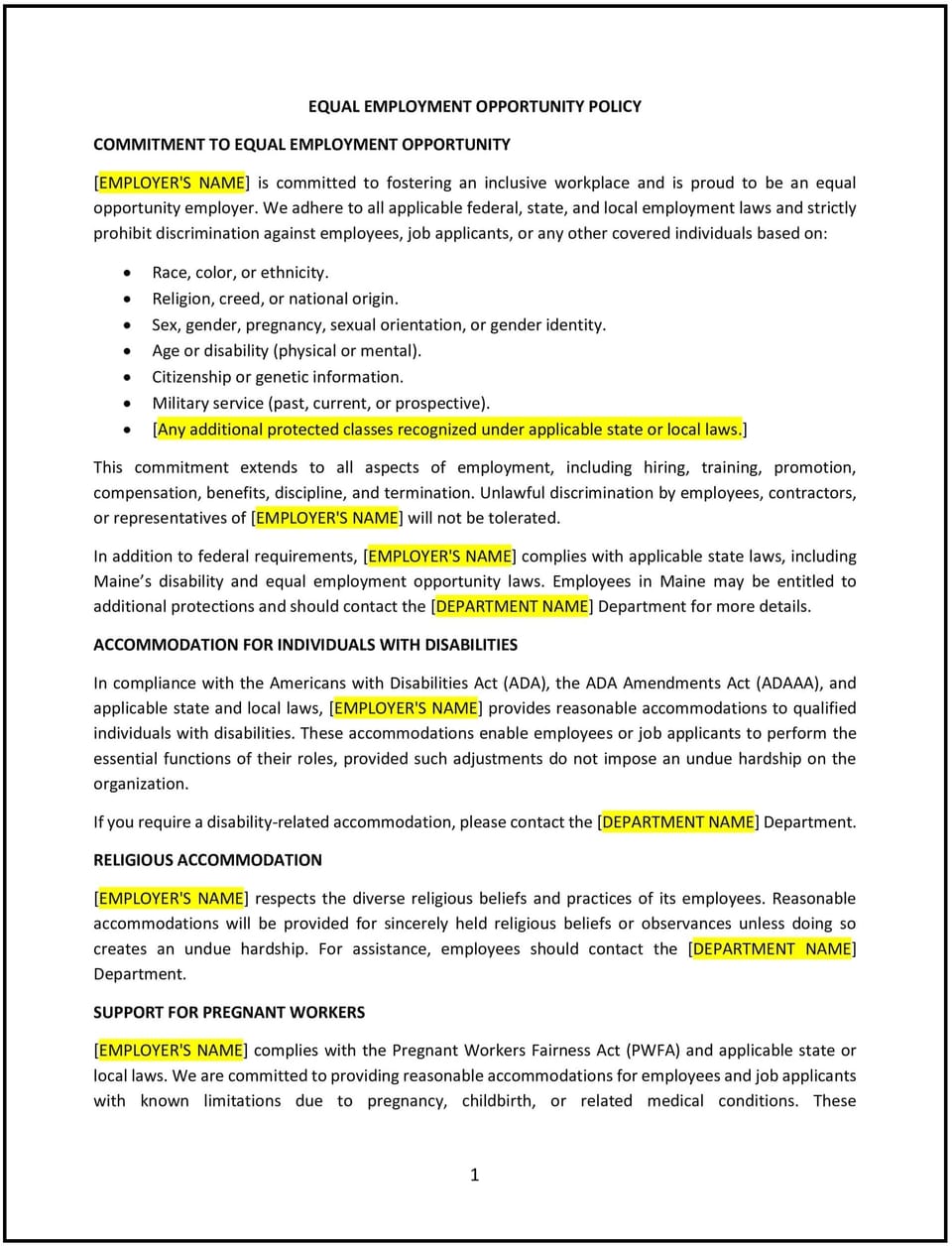Equal opportunity policy (Maine): Free template

Equal opportunity policy (Maine): Free template
This equal opportunity policy is designed to help Maine businesses promote a fair and inclusive workplace by prohibiting discrimination and ensuring all employment decisions are based on merit. It outlines the business’s commitment to equal treatment for all employees and applicants, fostering a respectful and compliant workplace.
By implementing this policy, Maine businesses can enhance workplace diversity, ensure compliance with Maine and federal anti-discrimination laws, and support employee morale.
How to use this equal opportunity policy (Maine)
- Define the scope: Specify that the policy applies to all aspects of employment, including recruitment, hiring, promotions, compensation, and training.
- List protected characteristics: Include characteristics protected under Maine and federal laws, such as race, gender, age, disability, sexual orientation, religion, and national origin.
- Outline prohibited behaviors: Clearly state that discrimination, harassment, and retaliation based on protected characteristics are not tolerated.
- Detail reporting procedures: Provide steps for employees to report discrimination or harassment, including whom to contact and how complaints will be handled.
- Address reasonable accommodations: Commit to providing accommodations for employees with disabilities or religious practices, as required by law.
- Include disciplinary measures: Specify the consequences of violating the policy, such as warnings, training, or termination.
- Review regularly: Update the policy to reflect changes in Maine laws or workplace practices.
Benefits of using this equal opportunity policy (Maine)
Implementing this policy provides several benefits for Maine businesses:
- Promotes fairness: Ensures employment decisions are based on merit and qualifications.
- Enhances compliance: Aligns with Maine and federal anti-discrimination laws, reducing legal risks.
- Builds a positive culture: Fosters respect, inclusivity, and employee morale.
- Attracts diverse talent: Positions the business as an employer of choice for candidates from all backgrounds.
- Reduces liability: Minimizes the risk of discrimination claims and workplace conflicts.
Tips for using this equal opportunity policy (Maine)
- Communicate clearly: Share the policy with employees during onboarding and include it in the employee handbook.
- Train employees: Provide regular training on anti-discrimination laws and respectful workplace practices.
- Lead by example: Ensure management models inclusive and fair behavior.
- Monitor compliance: Regularly review workplace practices to identify and address potential biases or issues.
- Foster open dialogue: Encourage employees to share concerns or suggestions related to diversity and inclusion.
- Stay informed: Keep updated on changes in Maine and federal laws affecting equal opportunity policies.
Q: What is the purpose of an equal opportunity policy?
A: The policy ensures all employment decisions are based on merit, prohibits discrimination, and promotes a fair and inclusive workplace.
Q: What characteristics are protected under this policy?
A: Protected characteristics include race, gender, age, disability, sexual orientation, religion, national origin, and any others outlined by Maine and federal laws.
Q: How can businesses ensure compliance with equal opportunity laws?
A: Businesses should provide training, monitor workplace practices, and address complaints promptly and fairly.
Q: How often should businesses review their equal opportunity policy?
A: Businesses should review the policy annually or whenever there are updates to Maine or federal laws.
Q: What steps should employees take to report discrimination?
A: Employees should follow the reporting procedures outlined in the policy, which typically include contacting HR or a designated officer.
Q: How can businesses handle complaints of discrimination or harassment?
A: Businesses should investigate complaints promptly, maintain confidentiality, and take appropriate corrective actions if necessary.
Q: Are reasonable accommodations included in this policy?
A: Yes, businesses should commit to providing accommodations for employees with disabilities or religious practices as required by law.
This article contains general legal information and does not contain legal advice. Cobrief is not a law firm or a substitute for an attorney or law firm. The law is complex and changes often. For legal advice, please ask a lawyer.


